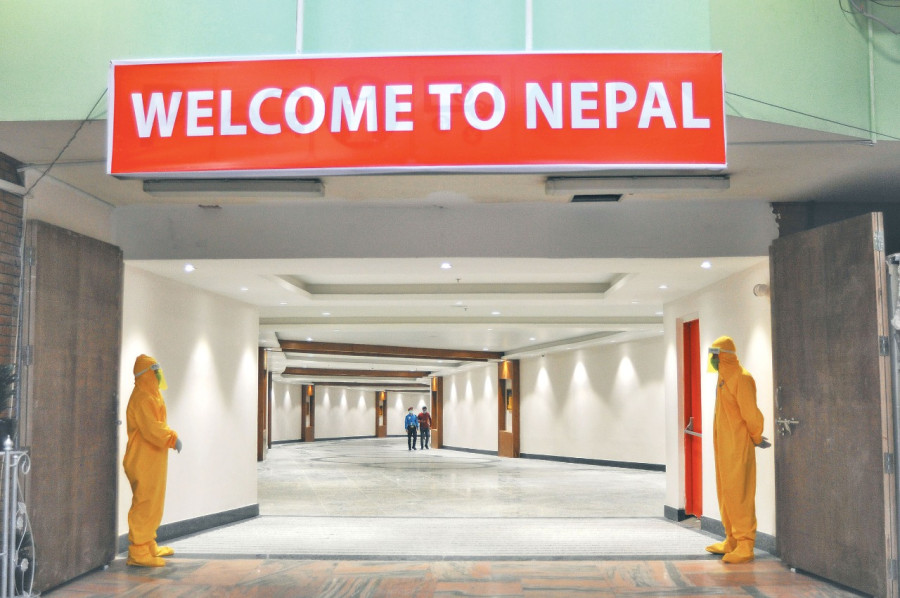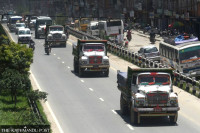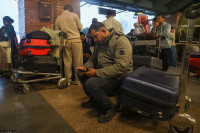National
On the horns of a dilemma: Nepal wants to say it is open to the world, but Covid-19 cases are rising
Officials from ministries are mulling over various measures, including how the country should welcome the arriving tourists when flights resume in about 10 days.
Sangam Prasain
The government said on July 20 that international and domestic flights will resume starting August 17, and asked the travel and tourism industry to take bookings for the autumn season accordingly.
However, the rising number of coronavirus cases has sent officials into a tizzy.
Ministers and secretaries from the Home, Foreign Affairs, Tourism and Health ministries have been holding marathon discussions since Wednesday, in order to decide on new emergency steps, a senior government official told the Post on Thursday.
According to the official, there are so many things on the table.
One of the issues is how to handle the arrivals when the flights resume.
“The Ministry of Foreign Affairs is not interested in providing on-arrival visas. The Health Ministry is also for regulating tourist movements,” said the official who spoke on condition of anonymity because of the sensitivity of the matter.
The Health Ministry on Thursday confirmed 360 new cases. Kathmandu reported 76 cases in the past 24 hours. Nepal’s Covid-19 toll reached 65 on Thursday after five deaths were registered in the past 24 hours while the total number of cases surged to 21,750.
Tourism is one of the sectors hit hardest by the Covid-19 pandemic. The tourism sector contributes around 8 percent to Nepal’s economy.
With no tourists since the lockdown was imposed on March 24 and flights suspended for the last five months, the service sector, including restaurants, hotels and tourism sector, too has taken a massive beating.
As the government plans to open tourism this autumn—September to November—there is a silver lining amid the global pandemic.
But authorities seem to be on the horns of a dilemma, as Covid-19 cases are rising. The autumn season accounts for a third of 1.2 million annual tourist arrivals.
Finance Minister Yubaraj Khatiwada, who is also the government spokesperson, said at the weekly press briefing on Thursday that the government is coming up with “some emergency measures” soon.
Khatiwada did not elaborate on the measures.
Officials, however, said they will probably mean discouraging arrivals—particularly of tourists—and deferring the reopening of long-distance transportation services and schools and colleges.
An official who is familiar with the ongoing meetings said that guidelines are being prepared for three sets of people—tourists, non-resident Nepalis, and officials of diplomatic missions, donor agencies and their families.
The guidelines, which are yet to be finalised, have set a few requirements for tourists–negative polymerase chain reaction (PCR) test results no older than 72 hours on arrival; another PCR test in Nepal from government-designated hospitals and clinics; 14 days of quarantine in hotels; and Covid-19 travel insurance.
“All these documents, except the PCR test in Nepal, should be submitted while boarding a plane,” said the official. “As per the preliminary discussions, tourists can spend seven days in quarantine in Kathmandu hotels, and another seven days in hotels outside Kathmandu.”
Travel agencies are required to take all the responsibilities of the tourists, starting from picking them up at the airport.
The tourists, however, need to apply for visas at Nepal's diplomatic missions in their respective countries.
“This is purely aimed at discouraging travellers’ movement,” said the official. “No one will afford to go through these hassles and it is costly as well."
The government on July 21 lifted the four-month-long nationwide lockdown and announced opening scheduled domestic and international flights starting August 17.
Hotels, restaurants, and trekking and mountaineering businesses were allowed to open from July 30 and start bookings for autumn tourism after a disappointing spring that saw tourist arrivals hit rock bottom because of the pandemic.
For the officials of diplomatic missions, donor agencies and their families, discussions have been going on about providing on-arrival visas.
“But they all have to spend 14 days in quarantine in hotels in Nepal. The PCR test rule that will be enforced for tourists will also be applicable for them,” said the official.
Non-resident Nepalis will have to submit a PCR test certificate at the airport or the plane they are boarding.
“Discussions are being held to provide them on-arrival visas,” said the official.
The government is also taking some measures to bring back migrant workers stranded in different parts of the world.
Khatiwada said that the government would bring back around 45,000 Nepalis stranded in different countries.
“But we still suggest that people who are not suffering and are safe stay where they are,” said Khatiwada.
The government has already started enforcing additional measures to prevent Covid-19 more than two weeks after the lockdown was lifted.
On Wednesday, the government decided to restrict public and vehicular movements enforcing the odd-even rule on vehicles, with effect from Thursday.
The Home Ministry has also barred all kinds of public gatherings—parties, seminars, feasts and other social gatherings at hotels and restaurants.
“We have to reduce the rate of the virus spread,” Khatiwada told the media. “It is not the appropriate time to allow flights, long distance transportation and schools to resume. The Covid-19 Crisis Management Centre meeting will soon take appropriate decisions as the risk is increasing.”




 23.51°C Kathmandu
23.51°C Kathmandu















